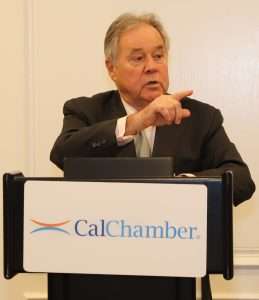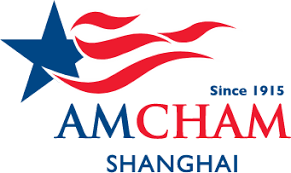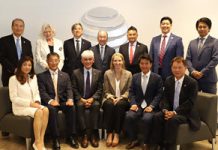
An “on-the-ground” update on doing business in China was presented last Friday at the CalChamber Council for International Trade breakfast by Ken Petrilla, the U.S. representative of the American Chamber of Commerce (AmCham) in Shanghai.
China is in the throes of an incomplete transition from a “tangible value economy” to an “intangible value economy,” said Petrilla, who also is managing director and U.S. representative of ChinaVest, a Shanghai-based merchant bank.
The gathering of nearly 40 CalChamber members, including members of the CalChamber Board, was sponsored by Suburban Water Systems.
The challenges the country’s transition is causing, Petrilla reported, include:
- the Chinese Communist Party has created rules requiring companies to turn over technology to operate in China;
- production of more and more things without U.S. components;
- regulations that seem to be designed to limit U.S. companies’ access to China’s growing consumer market;
- since state-operated enterprises (SOEs) are back to being privileged borrowers, the danger of misallocation of credit has increased considerably, thereby handicapping the private sector;
- the technology race enormously complicates and conflates the issues between the United States and China.
Whereas governance in China once was “top down,” with control coming from Beijing, Petrilla explained, now decisions are made at the regional or provincial level. Economic advances and the growth of a Chinese middle class have created a constituency that wants quality of life things like clean water, safe food, better food distribution and better health care, he commented.
The situation creates opportunities for Western companies that can fulfill such needs for middle-size cities and companies would be wise to spend time cultivating relations with cities outside of Beijing, Petrilla observed.
Despite the tensions between the United States and China, Petrilla said, AmCham Shanghai’s annual business report, released in September, showed that China remains an attractive market for U.S. businesses. Growing consumption, as well as an improving regulatory environment in many sectors means that companies don’t want to leave. In fact, many companies are moving to localize their operations, he added.
AmCham Shanghai
AmCham Shanghai, known as the “Voice of American Business” in China, was founded in  1915. It was the third American Chamber established outside the United States, and now has 3,000 members from 1,500 companies. As a nonprofit, nonpartisan business organization, AmCham Shanghai is committed to the principles of free trade, open markets, private enterprise and the unrestricted flow of information.
1915. It was the third American Chamber established outside the United States, and now has 3,000 members from 1,500 companies. As a nonprofit, nonpartisan business organization, AmCham Shanghai is committed to the principles of free trade, open markets, private enterprise and the unrestricted flow of information.
Petrilla explained that AmCham Shanghai strives to be the leading international business association in China.
As pointed out by Petrilla and on the AmCham Shanghai website, the organization’s mission is to enable the success of its members and strengthen U.S.-China commercial ties through its role as a not-for-profit service provider of high quality business resources and support, policy advocacy and relationship-building opportunities.
Office in San Francisco
On September 20, AmCham Shanghai kicked off its California initiative with a well-attended high-level conference at the San Francisco Chamber of Commerce. The China Business Conference featured discussions on the real business environment in China, the political and security framework affecting the relationship and strategies on how companies should manage intellectual property rights issues.
The conference also launched AmCham Shanghai’s California office, which will connect the West Coast with business opportunities in China and allow nonresident members access to AmCham Shanghai services and content, including quarterly briefings in San Francisco, webinars, an annual business conference in San Francisco, and hot-desk services when nonresident members visit Shanghai.
Questions about a nonresident membership in AmCham Shanghai can be directed to Petrilla at ken.petrilla@amcham-shanghai.org.
Staff Contact: Susanne T. Stirling

